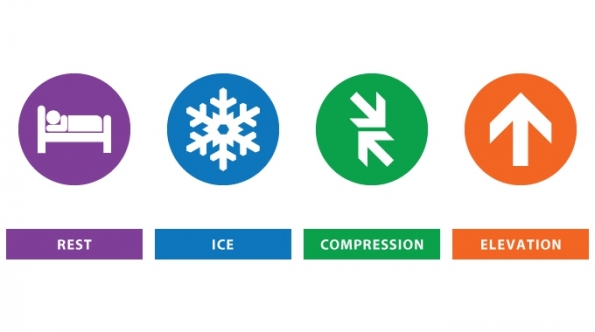YOUR PHYSIO
New pain problem
Quick Links
Managing a soft tissue injury PDF
A downloadable / printable version of this page.
Common Aches and pains
Recommended exercises for new pain problems from arthritis UK. Links to exercise pamphlets for early pain problems of different parts of the body.
Managing a soft tissue injury

- The most common injuries in active people
- RICE protocol is the best immediate treatment in the first 48 hours
- Symptoms usually settle within 6 weeks
- Physiotherapy rehabilitation can be useful in getting back to sport
What are soft tissues?
- Soft tissues are the structures in the body that connect, support and move the bones and joints.
- The most common soft tissues involved in injury are:
- Ligaments: strong supporting tissue that connects bone to bone.
- Muscle: muscles are made up of fibres that contract and lengthen to produce or control movement of joints.
- Tendon: the part of the muscle that connects to bone. made up of collagen and elastic fibres.
How do soft tissue injuries occur?
Soft tissue injuries usually occur as a result of trauma or injury or as a result of overuse.
What are the symptoms?
The most common symptoms are pain and swelling. Sometimes bruising may also occur. Bruising can be a sign of a more significant injury (such as a tendon or ligament rupture). We would recommend you seek a specialist opinion as soon as possible if you suspect a more significant injury.
What is the best initial treatment?
The best initial treatment for soft tissue injuries is referred to as the RICE protocol. The RICE protocol is designed to reduce bleeding, swelling and pain.
RICE stands for:
- Rest: Try and do as little as possible with the injured area for 48-72 hours after injury
- Ice: Ice should be applied around the area regularly in the first 72 hours after injury as often as every 2-3 hours. If you don't have an Ice pack to hand try a bag of frozen peas wrapped in a towel. Always protect your skin from the risk of frostbite by using a damp towel or flannel between the ice and your skin. Check the iced area regularly during treatment every 5-10 minutes. There is not much benefit from applying ice for more than 15 minutes in one treatment session. The video below shows a method for repeating ice packs in the first few days after injury.
- Compression: A special compression bandage can be obtained for most soft tissue injuries from your local pharmacy.
- Elevation: Keeping the injured area elevated can reduce swelling.
The no HARM protocol should also be used in the first 72 hours- no Heat, no Alcohol, no Massage. Again the point of this is to ensure decreased bleeding and swelling in the affected area.
What should I do next?
After 72 hours it is advisable to start trying to move the affected area (the MICE protocol - Movement Ice Compression Elevation). Your pain should gradually settle and you should be able to return to normal activity.
Your symptoms should show signs of improvement quite rapidly over the next few weeks.
If your pain persists beyond 6 weeks physiotherapy may be helpful to get things back to normal, discuss a referral with your GP or you can refer yourself here.